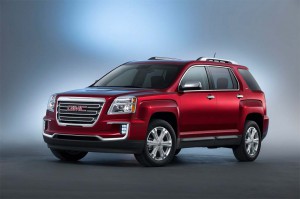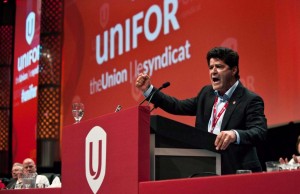With negotiations at General Motors’ former CAMI plant in Ingersoll, Ontario, at a standstill, Unifor is holding a rally in the Canadian capital of Ottawa today to sound off against the North American Free Trade Agreement.
The union wants the deal renegotiated because it says the deal has cost Canada’s auto sector jobs and investment during the past 25 years, and it is part of the reason the why the workers are on the picket line right now.
The 3,000 workers at the Ingersoll plant went on strike early Monday when negotiators from GM and Unifor reached an impasse over the automaker’s future plans for the plant, which has just started building a new version of the popular Chevrolet Equinox. In August, GM idled 600 employees at the Ingersoll plant as it shifted production of the GMC Terrain to Mexico.
“No formal contract negotiations have taken place, though each day there has been communication (text and telephone) between the parties. We have found no common ground on the major issues at this time,” Mike Van Boekel, Unifor Local 88 bargaining chairman, and Dan Borthwick, Unifor Local 88 president, said in a joint statement posted to the local’s website.
(Labor dispute idles production of hot-selling Equinox. For the story, Click Here.)
Union bargainers have demanded guarantees from the company that additional products will be built at Ingersoll in the future, setting off a collision with GM, leading to the first strike at auto plant in Canada since 1996.

Union workers at GM's Ingersoll, Ontario, plant are angry that the automaker moved production of the GMC Terrain to Mexico.
The dispute at Ingersoll with its link to GM’s decision last winter to move jobs from Canada to Mexico also has gotten tangled up in the ongoing discussions about the future of NAFTA initiated by President Donald Trump.
Jerry Dias, Unifor president, has been an outspoken critic of NAFTA, saying the trade pact, which set out rules for trading between the U.S., Canada and U.S. needs to be revised to strengthen the rights of workers in all three countries.
(Click Here for more about the Ingersoll strike.)
Under pressure from Dias and Unifor, Canadian trade negotiators have pushed several changes that would give workers additional rights under NAFTA. One of the Canadian proposals calls the elimination of “Right To Work” laws, which are used, particularly in the southern United States to discourage employees from organizing unions.
The U.S. negotiators are reportedly pushing to change the “Rules of Origin,” which would mean that cars exported to the US. from Canada and Mexico would be required to have a larger percentage of parts manufactured in the United States.
Both Canada’s desire for labor reform, which appears to have sharpened by the Ingersoll strike and changes to the rules of origin demanded by the Trump administration, could make it virtually impossible to come up with any kind of compromise by the end of the year, which is the deadline for reaching a deal.
(Canadian auto union blasts GM for moving work to Mexico. Click Here for the story.)
Failure of the negotiations could leave the fate of NAFTA in the hands of President Trump, who threatened to have the U.S. withdraw from the existing trade pact.


Unifor is only going to guarantee no future products will be built in Canada.